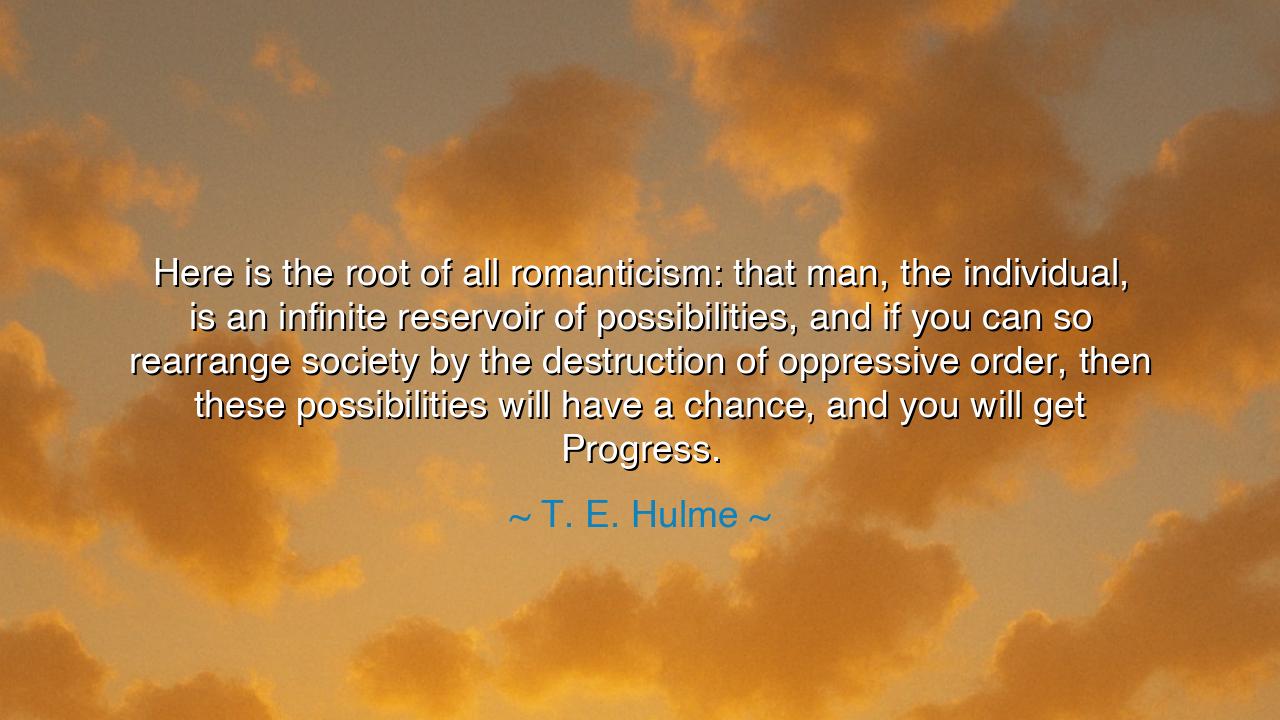
Here is the root of all romanticism: that man, the individual, is
Here is the root of all romanticism: that man, the individual, is an infinite reservoir of possibilities, and if you can so rearrange society by the destruction of oppressive order, then these possibilities will have a chance, and you will get Progress.






In the sacred depths of the human spirit lies a truth that echoes through the ages — the belief that the individual is an untapped wellspring of potential. T. E. Hulme captured this in his words: “Here is the root of all romanticism: that man, the individual, is an infinite reservoir of possibilities, and if you can so rearrange society by the destruction of oppressive order, then these possibilities will have a chance, and you will get Progress.” In these powerful words, Hulme speaks to the very heart of human yearning, a deep and unyielding desire for freedom and expression, a belief that every person, when freed from the chains of an oppressive system, holds the key to their own growth and the advancement of all.
The romanticism to which Hulme refers is rooted in the belief that the individual, when given the freedom to flourish, can create a world of unimaginable possibility. It is the vision of a society where restrictions—be they political, cultural, or social—do not stifle the creative potential of the individual. In the ancient world, Plato and Aristotle both explored the idea of the individual’s role in society, but for them, the role of the state and its order was paramount in guiding individuals toward the common good. Yet, as Hulme’s romanticism suggests, there is another vision, one where freedom from oppressive order leads to unlimited progress. The individual, when freed from societal constraints, becomes the well-spring of new ideas, innovations, and transformations.
The idea that man is an infinite reservoir of possibilities is not one limited to the romantic thinkers of the 18th and 19th centuries, but is found throughout history. Consider the rise of the Renaissance, a time when Europe, having emerged from the Dark Ages, embraced the belief that human beings were capable of greatness, of achieving their highest potential. The humanists of this period rejected the old hierarchical systems that confined individuals and instead focused on the limitless potential of the individual mind. It was a time of unparalleled creativity, as thinkers, artists, and scientists like Leonardo da Vinci, Michelangelo, and Galileo Galilei pushed the boundaries of human knowledge and expression. The Renaissance was a manifestation of the romantic ideal that liberation from oppressive structures could lead to unprecedented progress.
The French Revolution, another pivotal moment in history, serves as a powerful example of this same principle. The revolutionaries, driven by a desire to overthrow the oppressive monarchy and the rigid social orders, believed that by dismantling the old system, they would unleash the potential of the common people. Figures like Maximilien Robespierre and Jean-Paul Marat argued that only by destroying the old order could the revolutionary potential of individuals be realized. While the revolution’s ultimate outcomes were complex and often tragic, it remains a powerful reminder that societies, when reimagined, can unlock new possibilities for growth and advancement. Just as Hulme suggests, the progress that comes from the freedom of the individual is inseparable from the radical restructuring of the oppressive forces that stifle human creativity.
Yet, the romantic vision of unlimited possibility is not without its challenges. History teaches us that the rearranging of society, though often driven by noble ideals, can come with consequences. The collapse of old systems can give rise to chaos, as seen in the aftermath of the French Revolution, or in the Russian Revolution of 1917, where the pursuit of an ideal society led to a new form of oppression under the Soviet regime. Thus, while romanticism may celebrate the liberation of the individual, it must also contend with the reality that the road to progress is not always linear, and that the destruction of oppressive orders can, at times, give birth to new forms of control or suffering.
In our own lives, the lesson Hulme offers is both inviting and warning. The power of the individual to shape the course of history is undeniable. Creative potential exists in each of us, and when we are freed from the constraints of societal expectations, we can contribute to the advancement of society in extraordinary ways. However, we must approach this potential with the wisdom of those who have come before us. The destruction of oppressive order, while necessary at times, must be pursued with thoughtfulness and balance. We must not be so enamored by the idea of liberation that we fail to see the responsibility it carries. Progress, true progress, does not come solely from tearing down the old, but from building something that serves the common good, that elevates the individual without undermining the collective.
Thus, the lesson for each of us is clear: freedom, creativity, and progress are all connected, but they are also fragile. To unlock the infinite possibilities within us, we must first recognize that true progress requires not just the destruction of the old, but the construction of something new — something that nurtures the individual while strengthening the community. As we embark on our own journeys, let us remember the wisdom of those who have shaped history and the responsibility that comes with the freedom to create. May we rearrange society not just for the sake of change, but for the sake of progress that benefits all. Let the dynamic force of human potential guide us, as we embrace the delicate balance between freedom and responsibility, and work toward a world where both the individual and society can truly thrive.






AAdministratorAdministrator
Welcome, honored guests. Please leave a comment, we will respond soon